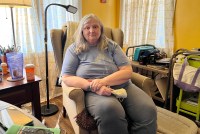Latest Morning Briefing Stories
The US Remains a Grim Leader in Preterm Births. Why? And Can We Fix It?
American women are more likely to deliver their babies prematurely than women in most developed countries. It’s a distinction that coincides with high rates of maternal and infant death, billions of dollars in costs, and even lifelong disabilities for the children who survive.
Listen to ‘Tradeoffs’: Medical Debt Delivers ‘A Shocking Amount of Misery’
Medical debt in America pushes families to the edge. Ariane Buck and his wife, Samantha, were denied care at their doctor’s office because of an unpaid bill of less than $100. A trip to the emergency room added thousands of dollars to their health care debt, which topped $50,000 by the time they filed for bankruptcy.
FDA Looks Into Dental Device After KHN-CBS News Investigation of Patient Harm
The FDA’s interest in the AGGA dental device follows a KHN-CBS News investigation, according to a former agency official.
New CDC Opioid Guidelines: Too Little, Too Late for Chronic Pain Patients?
In November, the Centers for Disease Control and Prevention released new guidelines for prescribing opioids for pain, allowing physicians more flexibility. But doctors, patients, and advocates wonder if the updated standards will be too little, too late to help chronic pain patients in a country still focused on fighting the ongoing opioid crisis.
Two Counties Square Off With California Over Mental Health Duties
The state wants to stop paying Kaiser Permanente for treating severely mentally ill Medi-Cal patients in Sacramento and Solano counties and force the counties to take on the task. The counties’ leaders say they can’t afford it.
Pandemic Stress, Gangs, and Utter Fear Fueled a Rise in Teen Shootings
With their brains still developing and poor impulse control, teens who carry firearms might never plan to use them. But some do.
Black Lung Resurgence Drives Push to Protect Coal Miners Against Silica Dust
Since 2005, central Appalachia has recorded a tenfold increase in cases of severe black lung disease among long-term coal miners. Now, federal regulators are expected to propose a new rule to protect against silica dust, which causes the most severe form of black lung, progressive massive fibrosis.
Feds Move to Rein In Prior Authorization, a System That Harms and Frustrates Patients
The federal government wants to change the way health insurers use prior authorization — the requirement that patients get permission before undergoing treatment. Designed to prevent doctors from deploying expensive, ineffectual procedures, prior authorization has become a confusing maze that denies or delays care, burdens physicians with paperwork, and perpetuates racial disparities. New rules may not be enough to solve the problems.
An Arm and a Leg: Wrestling With a Giant: How to Dispute a Hospital Bill
One listener tried to dispute a $1,300 “facility fee” with the treating hospital, his insurer, a bill-mediation service provided by his employer, and finally a debt collector. He didn’t win, but he learned valuable lessons about advocating for hospital discounts.
What the Health? From KFF Health News: Biden Budget Touches All the Bases
Very little in the proposed budget released by the Biden administration is likely to become law, particularly with Republicans in charge of the U.S. House. Still, the document is an important statement of the president’s policy priorities, and it’s clear health programs are among those he feels are important. Meanwhile, five women who were denied abortions when their pregnancies threatened their lives are suing Texas. Shefali Luthra of The 19th, Victoria Knight of Axios, and Margot Sanger-Katz of The New York Times join KHN’s Julie Rovner to discuss these issues and more. Also this week, Rovner interviews Harris Meyer, who reported and wrote the two latest KHN-NPR “Bill of the Month” features. Both were about families facing unexpected bills following childbirth.
Seniors With Anxiety Frequently Don’t Get Help. Here’s Why.
Older people often aren’t being screened for anxiety disorders, even though it is a common affliction — one masked by other problems when growing old.
Black Patients Dress Up and Modify Speech to Reduce Bias, California Survey Shows
Many Black patients also try to be informed and minimize questions to put providers at ease. “The system looks at us differently,” says the founder of the African American Wellness Project.
Montana Considers New Wave of Legislation to Loosen Vaccination Rules
Bills being considered by Montana lawmakers would allow people to refuse routine vaccinations based on their conscience, along with setting new rules for schools, courts, and businesses.
Medicaid Health Plans Try to Protect Members — And Profits — During Unwinding
States are turning to the big health insurance companies to keep Medicaid enrollees insured once pandemic protections end in April. The insurers’ motive: profits.
Why Does Insulin Cost So Much? Big Pharma Isn’t the Only Player Driving Prices
Big Pharma may be moving on from squeezing diabetes patients on insulin prices, but it’s the arbitrators that jack up prices for those who can least afford them.
Jimmy Carter Took on the Awful Guinea Worm When No One Else Would — And Triumphed
The effort to end Guinea worm disease relies almost entirely on changes in people’s behavior. There is no cure, no vaccination. When the 39th president of the United States left office, Jimmy Carter campaigned to eradicate the disease.
Reentry Programs to Help Former Prisoners Obtain Health Care Are Often Underused
More than 600,000 people are released from prisons every year, many with costly health conditions but no medications, medical records, a health care provider, or insurance.
California Offers Bipartisan Road Map for Protecting Kids Online Even as Big Tech Fights Back
Last year, state lawmakers adopted the country’s toughest online privacy restrictions. The law offers Congress a path forward on federal protections even as it serves as a cautionary tale for taking on Big Tech.
Girls in Texas Could Get Birth Control at Federal Clinics, Until a Christian Father Objected
A Donald Trump-appointed federal judge agreed that even the possibility that the father’s daughters might access contraception without his permission violated the tenants of his Christian faith.
For Young People on Medicare, a Hysterectomy Sometimes Is More Affordable Than Birth Control
While Medicare was designed as health insurance for those 65 and older, it also covers people with disabilities who are young enough to still get pregnant. Yet they often struggle to get their birth control covered and end up with large medical bills — or instead opt for hysterectomies or tubal ligations, which Medicare sometimes will cover.


























